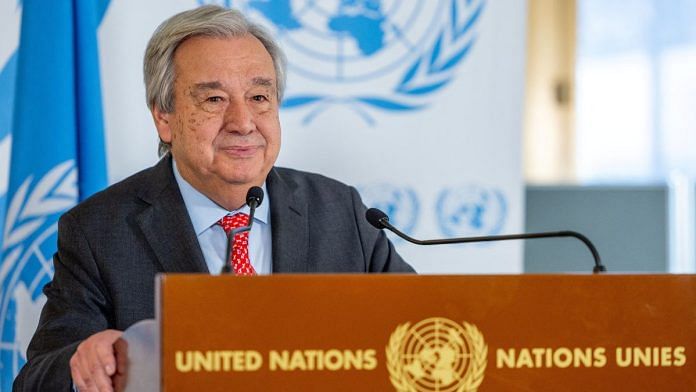Thank you dear subscribers, we are overwhelmed with your response.
Your Turn is a unique section from ThePrint featuring points of view from its subscribers. If you are a subscriber, have a point of view, please send it to us. If not, do subscribe here: https://theprint.in/subscribe/
On 6 June 2023 Slovenia was elected for one of the ten non-permanent seats of the United Nations Security Council (UNSC) for 2024-2025. It would represent the Eastern European electoral group. The Slovenian Minister of Foreign and European Affairs Tanja Fajon said “The confidence UN member states have placed in Slovenia is also a great responsibility and incentive to make progress during the membership term on issues that have been heard and discussed with representatives of other countries,”.
Slovenia has been a robust contender, due to its credentials, for the non-permanent seat of UNSC. It has provided consistent funding for the UN budget and made contributions to the UN peacekeepers missions especially through its personnel. In fact, they have got recognition for professional conduct, expert knowledge, as well as positively interacting with the respective societies where the UN peacekeepers are stationed. It has also called for protection of the civilian population and other vulnerable people in the global conflicts.
Slovenia has been strongly supporting the rule of law as a core tenet of its foreign policy. So, it does respect International Law. It entails resolving disputes through peace initiatives, adherence to the decisions of World Court as well as cooperation in action against war crimes. As a corollary, the Slovenian foreign policy gives priority to the protection and promotion of fundamental human rights including in the context of healthy environment, climate action, pandemic, AI, and even issues such as ageing. Interestingly, balancing its developmental agenda with environmental sustainability, Slovenia has been engaged in some core UN agendas that are critical in international development with an emphasis on green principles, resilience of the society and food security. In promoting global sustainability agenda (SDGs 2030), Slovenian diplomatic work has spread to areas like water resources and recovery from the COVID 19 pandemic by large-scaled vaccination drive. In contributing to the right to development, Slovenia has joined concerns of the developing countries, provided humanitarian assistance and sharing of responsibility to elevate people from abject poverty, narrowing the income inequality, promotion of gender equality and attaining sustainably for a better planetary future.
Slovenia has staunchly supported for a constructive debate for the long pending reforms for an effective UNSC for maintenance of international peace and security. It has encompassed, Slovenia’s contribution for world peace and stability. As a non-permanent UNSC member, Slovenia could possibly reflect on and further push for the traditional Eastern support for the EU’s global role in addressing global challenges in the third decade of the 21st century. As of 2022, its foreign policy has comprised some core elements such as: (i) The integration of EU: Slovenia did support the integrating process of the Europeans when it came to Eastern nation-states in Europe. Slovenia had done advocacy for an enlarged EU in order to include the West Balkan countries, encouraging a stable polity, good economic developmental work, as well as cooperating inside that region; (ii)
Good Neighbourly Relations: Slovenia did participate actively in EU’s neighbourhood policies, that had the aim to build a stable as well as a prosperous relationship with the nation-states in Eastern Europe and the Southern Mediterranean. It includes promotion of the democratized governance, International Law, as well as good economic initiatives for developmental activities; (iii) Bilateral Relationship: Slovenia has good bilateral ties with all countries of Eastern Europe. These relations have been on the basis of shared interest, cooperating on key economic issues, as well as diplomatic alignments. However, the particular focus of every country varies based on their historical ties and goals; (iv) Cooperation on Security: Providing cooperation on defence matters has been one of the critical aspects of the Slovenian foreign policy in Eastern Europe. It involves participating in the defence initiatives of the region as well as supporting various kinds of measures for enhancing the stability and security of the region. In this respect, Slovenia’s membership of NATO remains the fulcrum; (v) Energy Security: Slovenian geographical perimeter as well as need for energy is such that, it’s having an organic interest for ensuring energy security for the Eastern Europe as a whole. It includes engaging in deliberations as well as programs relating to the infrastructural and diversified sources of energy including renewables.
As Slovenia assumes its UNSC seat on o1 January 2024, the task is cut out for it to grapple with a host of issues on the agenda of the Council. The global conflicts such as Russia-Ukraine and Israel-Palestine as well as several other regular trouble areas such as Sudan, Somalia, Democratic Republic of Congo, Haiti, Yemen etc would warrant priority attention. It will be interesting to see as to how Slovenia works out the agenda when it gets a turn to assume rotational (in alphabetical order) monthly Presidency of the UNSC.
These pieces are being published as they have been received – they have not been edited/fact-checked by ThePrint.

